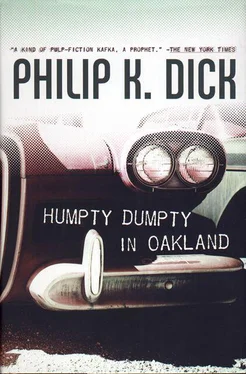He drove through traffic. Neither of them spoke.
When he got to the house on Grove Street he went on ahead of Lydia, up the steps and onto the porch. The front door, however, was locked, and so he had to wait for her. As soon as she had unlocked the door he went inside.
There in the living room he found the old man, looking about the same as always except that he had on a blue wool bathrobe and slippers, instead of his cotton work suit and shoes. He sat in the center of the couch, his feet up on a hassock, watching the television set. The room was filled with the din of the set. Al stopped and stood looking at the old man, who did not seem aware of him.
At last Al went over to the set and turned the sound down. Now the old man turned his head and noticed him.
“What’s the matter?” Al said.
The old man said, “I got a cut on my chest.”
“Nothing more?”
“Maybe a cracked rib. The doctor took X-rays. It’s taped up.”
“How’d it happen?”
“I fell,” the old man said.
“Slipped on grease?”
“No.”
Al waited. “How, then?” he said finally.
“On some wet grass,” the old man said.
“Where the hell’d you find any wet grass?”
From behind him Lydia said, “He was in Marin County.”
“Taking a vacation?” Al said.
“On business,” the old man said. He sat silently for a time, with a look on his face of grimness. He said nothing more. Al could not think of anything to say; he stood around, getting his breath, calming down. It did not seem so bad after all. Obviously the woman had gone off the deep end.
“Do you need or require anything?” Lydia said, approaching the old man.
“Maybe some coffee,” the old man said, “Cup of coffee?” he asked Al.
“Okay,” Al said.
Lydia disappeared into the kitchen. The two men remained together, both of them silent.
“She sure had me worried,” Al said.
The old man said nothing, nor did he show any expression.
“You’re feeling pretty good, aren’t you?” Al said. “How soon can you go back to work? What’d the doctor say?”
“He’ll call me. When he gets the X-rays.”
Al nodded. “Anything I can do?” he said presently.
“No,” the old man said. “Thanks.”
“Call some of your customers for you?”
“No.”
“Okay,” Al said. “You let me know.”
The old man nodded.
From the kitchen, Lydia called in a clear voice, “Mr. Miller, please come in here a moment.”
He went down the hall and into the kitchen.
At the sideboard, fixing the coffee, Lydia Fergesson said with her back to him, “Please get out of the house now that you have seen him long enough.”
Al said, “Listen, I’ve worked with this guy for years.” His anger, his dislike for her, filled him.
“Long enough,” she said in a brisk, bright, commanding voice, almost a merry voice, as she went about getting coffee cups.
“What did I ever do?” he said.
Turning in his direction, Lydia said, “Despite what he says he is ill. He is an ill man.”
“Okay,” he said.
“Allow him to remain at home where he belongs and recuperate. Make no demands.”
“What like?” he demanded. “What demands? What do you mean? What do you think I do to him or get out of him? You think I’m always having him fix up my cars for me? Maybe that’s it.” He felt both hate toward her and gloom, his old usual gloom. Certainly it was so; he did make use of the old man. And she had never liked him. She used the old man, too, and so she could easily see what went on. “Consider that I give him a hand,” he said. “With the heavy stuff. Did you consider that? You better consider that, too.”
She said nothing. She went on bustling about in her kitchen, paying no attention to him, smiling in her fixed fashion. Waiting for him to leave, now that she had said her piece.
For a time he stood there. He tried to think of something to say, but no idea came. Only his feeling. At last he turned and walked back to the living room. He found the old man again watching the TV set, with the sound still turned down; the old man faced the set and kept his attention on it, on the watery gray shapes.
“So long,” Al said. “I have to be going.”
Presently the old man nodded. Al waited, but the old man did not speak. So he stuck his hands in his pockets and walked through the house to the front door.
A moment later he was outside on the sidewalk, getting back into his Chevrolet.
Driving away, he thought, I shouldn’t have left. I should have stuck around and saved him from that witch. That old harpy.
But he could not think of any excuse for going back, any way to put it that would make his return seem justified.
I really don’t amount to a good God damn, he said to himself. I’m a bum, nothing but a bum. No wonder I don’t get anywhere. I have no drive, no ambition. I’m doomed and I know it. There’s no place for me. I don’t have the guts to carve any place out.
He did not go back to the lot; instead, seeing that the time was nearly five, he drove on home to his own apartment in the old gray three-story wooden building.
When he opened the door he heard sounds and smelled smells; Julie was home ahead of him, in the kitchen cooking chops on the stove for dinner. He came in and greeted her.
“Hi,” she said. She had on jeans and sandals, and that recalled to him that this was one of her non-working days. “Dinner won’t be ready for another half-hour. You’re early.”
He went to the cooler and got out a bottle of sherry.
“Somebody called for you,” Julie said. “A woman.”
“What’s her name?”
“Mrs. Lane. She left her number. She had something worthwhile to tell you, she said. You’re supposed to be sure and call.”
“A realtor,” he said. He seated himself at the table. “The old man had an accident today. A fall. They took him home.”
“That’s a shame,” Julie said, with no reaction at all in her voice, no surprise or regret or concern.
“Don’t you care?” he said.
“I don’t see why I should,” she said.
“I’m thinking of going back there,” he said. “To the house.”
“Don’t forget about dinner,” she said.
“You mean I better not. I better be here.”
Julie said, “I’m not going to fix it for you if you’re going over there. Why should I?”
To that he had no answer. He sat fooling with the sherry bottle.
“Are you going to call that realtor?” she said. “That Mrs. Lane?”
“No,” he said. “She’s a pest.”
“She sounded very nice.”
He said, “Tell her I’m out, if she calls again.”
While his wife fixed dinner he sat at the table drinking sherry. Presently he began to think over the idea he had for blackmailing the big businessman, Chris Harman. He had decided that the best way was to be absolutely direct about it, to call Harman’s number on the phone, either his business number or home phone, and when he got hold of him say simply, “Listen, I know you used to make dirty records, and that’s against the law. Pay me a lot of money or I’m going to the police about it.” Although he had tried he could not think of any improvement on that approach.
Maybe I ought to go do it now, he thought. While I’m in the mood. So he put down his glass and made his way into the living room, where the phone was. Seated at it, he turned the pages until he came to the Hs. At last he had the number of a Christian Harman, who lived in Piedmont. The address seemed right, and, taking the receiver off the hook, he began to dial.
But after he had dialed the prefix he changed his mind; he put the Teceiver back down and returned to pondering. Probably there were well-known better techniques for doing it, known to anyone who had ever gone into the matter. Who would know? Somebody like Tootie Dolittle, perhaps. He had done a lot of various things.
Читать дальше










